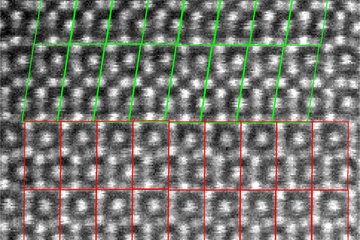All genres
721.
Talk
Tutorial on Thin Films: Stresses, Relaxation, and Size Effects. Electronic Materials and Applications, Orlando, FL, USA (2015)
722.
Talk
Probing deformation mechanisms of Cu structures relevant for electronic applications. Electronic Materials and Applications, Orlando, FL, USA (2015)
723.
Talk
Phase stability in nanostructured metallic materials with exceptional strength. 2015 MRS Fall Meeting, Symposium VV: In situ study of synthesis and transformation of materials, Boston, MA, USA (2015)
724.
Talk
Nanostructure and mechanical behavior of metastable Cu–Cr thin films grown by molecular beam epitaxy. 61. Metallkunde-Kolloquium - Werkstoffforschung für Wirtschaft und Gesellschaft, Lech am Arlberg, Austria (2015)
725.
Talk
Probing deformation and fracture of materials with high spatial resolution. EDSA 2015 – International Workshop on Stress Assisted Environmental Damage in Structural Materials, Chennai, India (2015)
726.
Talk
Are micro-fracture tests reliable? 2015 MRS Fall Meeting and Exhibit - Symposium T: Strength and Failure at the Micro and Nano-scale-From fundamentals to Applications
, Boston, MA, USA (2015)
727.
Talk
In situ micromechanics: An overview on µLaue based experiments to study GND accumulation in various loading geometries. International Symposium on Plasticity, Keynote lecture, Montego Bay, Jamaica (2015)
728.
Talk
Small Scale Mechanical Testing: More than just a fashionably tool?! Kolloquium für Mechanik, KIT, Karlsruhe, Germany (2014)
729.
Talk
Differences in deformation behavior of Cu structures containing individual grain boundaries. Symposium RR: Scaling Effects in Plasticity - Synergy between Simulations and Experiments, Fall MRS, Boston, MA, USA (2014)
730.
Talk
Bridging the gap between electrochemistry and microscopy: electrochemical IL-TEM and in-situ electrochemical TEM study. 2nd Conference on in In-situ and Correlative Electron Microscopy, Saarbrücken, Germany (2014)
731.
Talk
In-situ stress measurements in thin films using synchrotron diffraction. Summer School: Theory and Practice of Modern Powder Diffraction, Tagungshaus Schönenberg, Ellwangen, Ellwangen, Germany (2014)
732.
Talk
Nanotribology: Wear Mechanisms in Austenite. Materials Science and Engineering-MSE 2014, Darmstadt, Germany (2014)
733.
Talk
In situ micromechanics: An overview on synchrotron based µLaue experiments. XTOP 2014, Villard de Lans, France (2014)
734.
Talk
Mechanical behavior of nanolayered thin films: Interface control. 3rd General Meeting of the GDRi CNRS "Mechanics of Nano-objects", Empa, Thun, Switzerland (2014)
735.
Talk
Design and development of fracture property measurement techniques at the small scale. ICAMS (RUB), Bochum, Germany (2014)
736.
Talk
In-situ stress measurements in Cu films using synchrotron radiation. "Mechanical Issues for Flexible Electronics" Flex Workshop, Erich Schmid Institut, Leoben, Leoben, Austria (2014)
737.
Talk
From idealized bi-crystals towards applied polycrystals: Plastic deformation in small dimensions. Schöntal Symposium - Dislocation-based Plasticity, Kloster Schöntal, Germany (2014)
738.
Talk
From idealized bi-crystals towards applied polycrystals: Plastic deformation in small dimensions. TMS2014, 143rd Annual Meeting & Exhibition, San Diego, CA, USA (2014)
739.
Talk
Clamped beam geometry for fracture toughness testing of (Pt,Ni)Al bond coats at the micron-scale. AK- Rasterkraftmikroskopie und Nanomechanische Methoden, Düsseldorf, Germany (2014)
740.
Talk
Effects of the film thickness on the deformation behavior of thin Cu films on polyimide. Arbeitskreistreffen Rasterkraftmikroskopie und nanomechanische Methoden, Max-Planck-Institut für Eisenforschung GmbH, Düsseldorf, Germany (2014)











